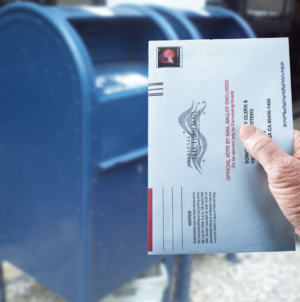-
US Postal Service Issues Advice on Voting by Mail - 13 mins ago
-
North Korean troops in Russia readying for combat in Ukraine war, S.Korea says - 25 mins ago
-
More than 2,000 Kaiser mental health workers could go on strike Monday - 31 mins ago
-
'Dodgers are simply the best offense in the sport' — Alex Rodriguez on LA's firepower | MLB on FOX - 34 mins ago
-
CVS Health CEO Karen Lynch steps down, replaced by David Joyner, after 19% stock plunge - 36 mins ago
-
PM to mark Hungary’s national holiday with speech in Budapest - 44 mins ago
-
Woman Has Very Unfiltered Reaction to Roommate’s New Haircut: ‘Oh my God’ - 52 mins ago
-
Harris has been called ‘soft’ and ‘tough’ on crime. What does her record show? - about 1 hour ago
-
Fifteen Manufacturers Offer Companies The Purchase of Electric Cars with State Support - about 1 hour ago
-
MOL and Turkish Petroleum Corporation sign strategic partnership MoU - about 1 hour ago
ADHD: New Treatment Could Help Reduce Symptoms in Young People
Young people with attention deficit hyperactivity disorder (ADHD) may benefit from tactile massage, according to a small study from the University of Gothenburg, Sweden.
People with ADHD tend to struggle with concentration, hyperactivity and impulsive behaviors.
“Tactile massage is a type of soft massage that focuses on slow, gentle strokes along the skin, applied with moderate pressure,” lead author Anna-Carin Robertz, from Gothenburg’s Sahlgrenska Academy, told Newsweek.
“One could say lighter than a brushstroke but harder than a feather. This type of massage stimulates what are called C-tactile fibers in the skin, which send signals to the brain that promote relaxation and reduce stress.
“It’s often used to promote a sense of calm and wellbeing, and in this study, we explored its potential benefits for individuals with ADHD.”
ADHD is one of the most common neurodevelopmental disorders, affecting an estimated 7 million children aged three to 17 in the U.S.—approximately 11.4 percent—and 15.5 million U.S. adults, according to the Centers for Disease Control and Prevention.
Sleep problems are more than twice as common among young people with ADHD, compared to their peers.
“I am a specialist nurse in psychiatry and have during my years in child and adolescent pshychiatry seen that many adolescents struggle not only with hyperactivity and inattention but also with regulating their stress levels and sleep,” said Robertz.
“While medications can be helpful, they don’t always address these issues fully, and some people experience side effects. I wanted to explore whether tactile massage could offer additional benefits in managing these symptoms and improving overall wellbeing.”
As part of the study, tactile massage therapy was given to 14 young people aged 15 to 17 with a diagnosis of ADHD, for 10 weeks.
The massage was delivered by certified massage therapists, following a specific protocol, and the young people were asked to rate mood and ADHD symptoms before, during and after the treatment.
The parents or guardians of the participants also filled out questionnaires about their child’s mood and symptoms.
The Gothenburg team of scientists found that symptoms of hyperactivity, impulsivity and attention deficit were significantly reduced, according to self-reported symptoms by the young people and their parents.
The young people with ADHD reported better sleep, saying it was much easier to fall asleep after the massage, which the scientists said was significant.
“People with ADHD often have difficulty sleeping due to a combination of factors,” said Robertz. “Their minds tend to be more active, making it hard to relax and fall asleep.
“They may also experience restlessness, which can disrupt their ability to stay asleep through the night.
“Additionally, many people with ADHD have irregular sleep patterns, and difficulties with impulse control can make it harder to establish consistent routines, which is important for healthy sleep.
“These challenges can create a cycle where lack of sleep worsens symptoms like inattention and hyperactivity during the day,” Robertz added.
Wavebreakmedia/Getty Images
There was also a clear reduction in irritation and defiant tendencies too—and the benefits of the tactile massage seemed to last, with some of the improvements still detectable at a three-month follow-up after the study.
The young people also reported feeling less pain after the massage, although this was not statistically significant, the scientists concluded.
“I had expected to maybe see some improvements in sleep, but I hadn’t anticipated the significant reductions in hyperactivity and improvements in concentration that we observed,” said Robertz.
“The research suggests that regular tactile massage could help calm hyperactivity, improve sleep, and promote relaxation, which can lead to better focus and a greater sense of well-being in daily life.
“If the method is implemented in clinical practice I think it could be used as a tool to teach parents, in order to be able to provide massage at home for their children.”
Do you have a tip on a food story that Newsweek should be covering? Is there a nutrition concern that’s worrying you? Let us know via science@newsweek.com. We can ask experts for advice, and your story could be featured in Newsweek.
Reference
Robertz, A.-C., Törnhage, C.-J., Nilsson, S., Nyman, V., & Kantzer, A.-K. (2024). Positive effects of tactile massage for adolescents with Attention Deficit/Hyperactivity Disorder (ADHD) – A small scale study. Complementary Therapies in Clinical Practice, 57. https://doi.org/10.1016/j.ctcp.2024.101909
Source link































